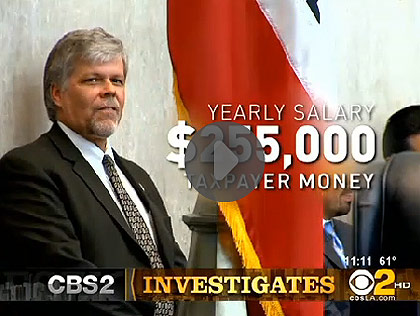Taxpayers Foot The Bill For Top LA County Chief's Commute To And From NorCal
LOS ANGELES (CBSLA.com) — Taxpayers are footing the bill for a top Los Angeles County official's more than 600-mile round-trip commute to and from his Northern California home, according to CBS2 investigative reporter David Goldstein.
LA County Chief Probation Officer Jerry Powers, who makes $255,000 a year, has headed the largest probation department in the nation for the past 17 months.
Goldstein said every Friday, Powers leaves his Downey office before noon, gets in his $40,000 taxpayer-funded SUV and drives to his family's house in the San Joaquin Valley.
Powers didn't return to work until mid-morning on Mondays.
"If I can get out because I don't have appointments...yes...I try to get out on Fridays early. It's not a secret," said Powers.
In one year, the official has put more than 46,000 miles on his vehicle.
Goldstein obtained Powers' county gas credit card statements, which showed he spent more than $5,400 of taxpayer money on fuel since January 2012.
The documents, however, didn't show the locations of the gas stations because of "security concerns."
"How many of these gas stations are driving to and from your residence up north? We don't know that," Goldstein asked Powers.
"It's about a 600-mile round-trip. I make that trip once a week. That is my commute, essentially," said Powers.
Goldstein reported that for just $50 a month, Powers is allowed to use the SUV for business or personal use—even transporting his golf clubs.
Bob Stern, a government ethics expert, said while commuting is not against the rules, it should be.
"But when you're traveling 300 miles with a county car, you probably should be reimbursing the county for those 600-mile round-trips he's making," said Stern.
One county official told Goldstein he had no problem with Powers' drive home as long as he's doing a good job.
During the weekdays, Powers lives out of a hotel in Southern California, which is also covered by taxpayers.
Goldstein found nearly $23,000 worth of room charges.
In Powers' contract, he's entitled to up to $25,000 in relocation expenses.
Powers wouldn't say if he had plans to move, but said he'll pay the hotel bills out of his own pocket when he reaches the limit.
He told Goldstein he makes no apologies for any of his actions.
"I can't speak to what the taxpayer feels is appropriate or not appropriate. I can only respond to...I'm not violating any county policy," said Powers.




